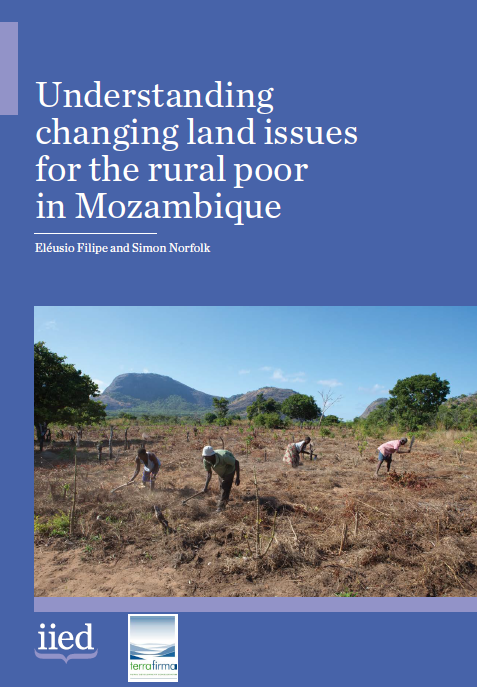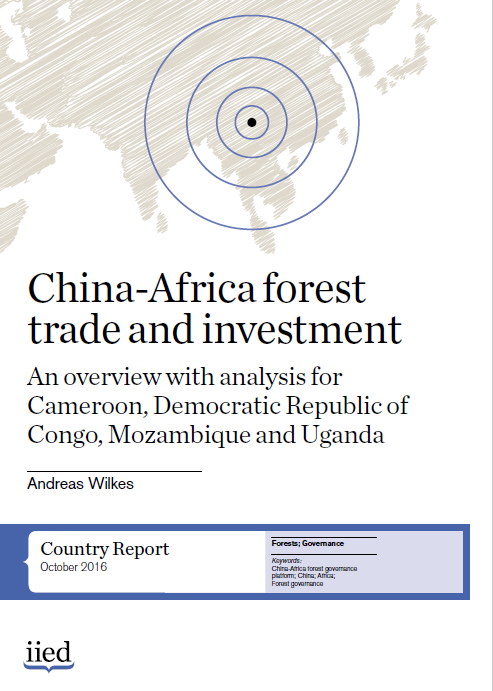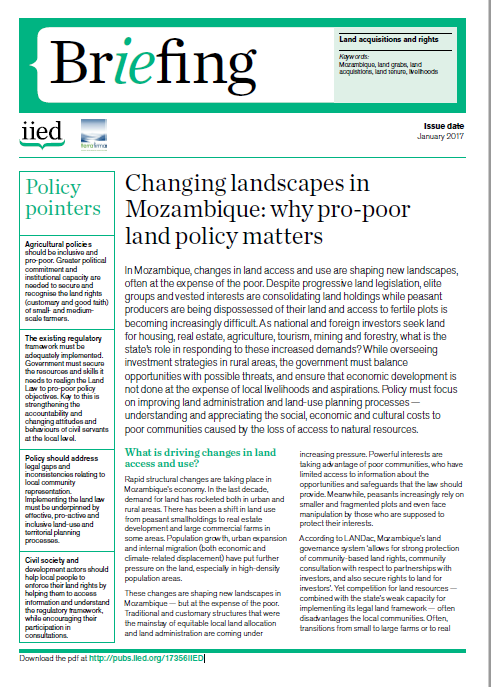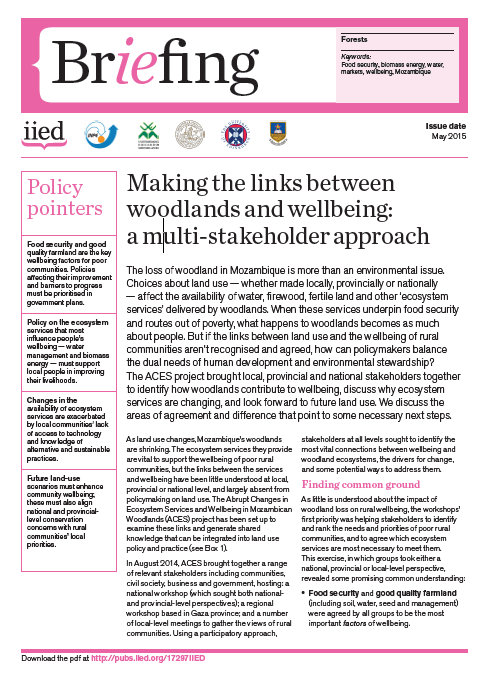
Topics and Regions
Details
Location
Contributions
Displaying 31 - 40 of 223Boosting governance in Mozambique’s forests
Mozambique is Africa’s largest exporter of timber to China. Yet multiple published concerns over the sustainability and legality of that timber trade assert the rapid commercial depletion of future timber stocks, the marginalisation of local forest communities, and the loss of revenue to government estimated at US$146 million between 2007 and 2013 alone.
Understanding changing land issues for the rural poor in Mozambique
This report is a product of a partnership between Terra Firma and the International Institute for Environment and Development (IIED), contributing to a study of changing land access in sub-Saharan Africa supported by the International Fund for Agricultural Development (IFAD).
China-Africa forest trade and investment
China’s investment and trade in Africa’s natural resource sectors have significant implications for Africa’s forests. Many investments are in forest areas. Some directly engage in logging while others, such as mining, infrastructure and agribusiness, affect forests and rural livelihoods. This report provides an overview of trends, evidence and issues related to the impacts on forests of Chinese investments in four African countries: Cameroon, Democratic Republic of Congo, Mozambique and Uganda.
Mozambique’s REDD+: the challenge is scaling success
The Testing REDD+ in the Beira Landscape Corridor of Mozambique initiative closed in December. Over nearly four years, a consortium of public academic and research institutions, NGOs and social enterprises, supported by the Government of Norway, has explored what drives deforestation and forest degradation. The programme trialled four interventions: to expand conservation agriculture, to make logging more sustainable, to harvest and use biomass energy more efficiently, and to promote sustainable production of an important non-timber product. We now know what works.
Mudanças nas paisagens moçambicanas: a importância das políticas da terra em prol das populações pobres
As mudanças no acesso e uso da terra em Moçambique estão a criar novas paisagens, geralmente às custas das populações pobres. Apesar de haver uma legislação progressista da terra, grupos de elite e interesses privados estão a consolidar as suas propriedades de terra, enquanto que os camponeses perdem as suas terras e o acesso a terrenos férteis fica cada vez mais difícil.
Changing landscapes in Mozambique: why pro-poor land policy matters
In Mozambique, changes in land access and use are shaping new landscapes, often at the expense of the poor. Despite progressive land legislation, elite groups and vested interests are consolidating land holdings while peasant producers are being dispossessed of their land and access to fertile plots is becoming increasingly difficult. As national and foreign investors seek land for housing, real estate, agriculture, tourism, mining and forestry, what is the state’s role in responding to these increased demands?
Cadeias de fornecimento de carvão vegetal de Mabalane para Maputo: quem beneficia?
O carvão vegetal é a principal fonte de energia para grande parte dos habitantes da cidade de Maputo. É também, uma fonte crucial de rendimento para os produtores rurais no distrito de Mabalane, um dos principais centros de abastecimento de carvão de Maputo. Mas as florestas de Mabalane – que fornecem a madeira para o carvão vegetal – também abastecem as populações rurais com materiais de construção, lenha e alimentos.
Charcoal supply chains from Mabalane to Maputo: who benefits?
Charcoal is the main cooking energy source for people living in Maputo city. It is also a crucial source of income for rural producers in Mabalane district, a key supplier of Maputo’s charcoal. But Mabalane’s forests — which provide the wood for charcoal — also supply rural populations with construction materials, firewood and food. Our research shows that the lack of community management in Mabalane’s charcoal trade has disadvantaged communities, widening income inequality and causing ecological depletion.
REDD+ and the private sector: tapping into domestic markets
Uncertainties in the international carbon market make it imperative the UN’s REDD+ framework engages a wider spectrum of the private sector than just international companies and investors. Countries with REDD+ programmes should work with their domestic private sector to provide the missing momentum. Micro, small and medium-sized enterprises are crucial, as these usually dominate in forest- and agriculture-based economies.
Making the links between woodlands and wellbeing: a multi-stakeholder approach
The loss of woodland in Mozambique is more than an environmental issue. Choices about land use — whether made locally, provincially or nationally — affect the availability of water, firewood, fertile land and other ‘ecosystem services’ delivered by woodlands. When these services underpin food security and routes out of poverty, what happens to woodlands becomes as much about people.










